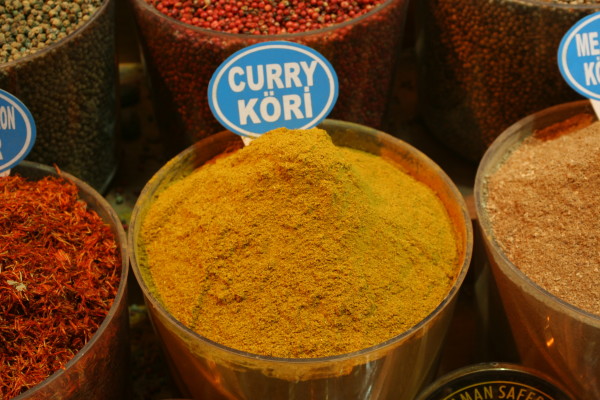Curry, a blend of spices used in a variety of cuisines, varies widely in composition. Many of the common ingredients include turmeric, fenugreek, coriander, cinnamon, and ginger, all of which provide considerable potential health benefits. The spice most-frequently noted for its anti-everything capabilities, however, is turmeric.
According to a laboratory animal study published in Evidence-Based Complementary and Alternative Medicine in 2013, Zhang et al. found that turmeric’s active compound, curcumin, prevented sharp spikes in blood sugar and improved insulin sensitivity in animals fed a high-fat diet, suggesting a positive impact on diabetes. Researchers noted that dietary curcumin was also effective in reducing the typically increased levels of fasting blood glucose (the levels of blood sugar while not eating), urine sugar, and urine volume in induced diabetic rats.
Image Source: Claudia Totir
The University of Maryland Medical Center notes that curry powder possesses anti-inflammatory properties that might help ease a variety of conditions, particularly osteoarthritis. Turmeric contains more than 24 compounds that fight inflammation in the body.
Turmeric also exhibits anticancer properties, according to the University of Maryland Medical Center. The curcumin in turmeric has been shown to help kill or slow the growth of several types of cancers, including breast, colon, prostate, liver, and skin cancers. Its benefits appear to stem from multiple mechanisms, including its ability to block the growth of new blood vessels that feed the tumors and prevent cancer cells from forming in the first place. Mahadi et al. also found that curcumin has been shown to inhibit strains of H. pylori, a carcinogen associated with the development of gastric and colon cancer.
In an animal study published in Science in April 2004, curcumin was shown to correct the most common expression of the genetic defect responsible for cystic fibrosis. Cystic fibrosis is a fatal disease that attacks the lungs with a thick mucus and currently afflicts about 30,000 American children and young adults. The most common mutation leading to Cystic Fibrosis is DeltaF508. This mutation causes the production of a misfolded protein that is kept within the cell and targeted for degradation. Curcumin was shown to induce the correctly folded protein in the cells of baby hamsters.
While these results look promising, more research is still needed before we can count on turmeric to solve all our problems. Nonetheless, having an extra serving of curry for dinner definitely won’t hurt!
Featured Image Source: Thomas Stiener










